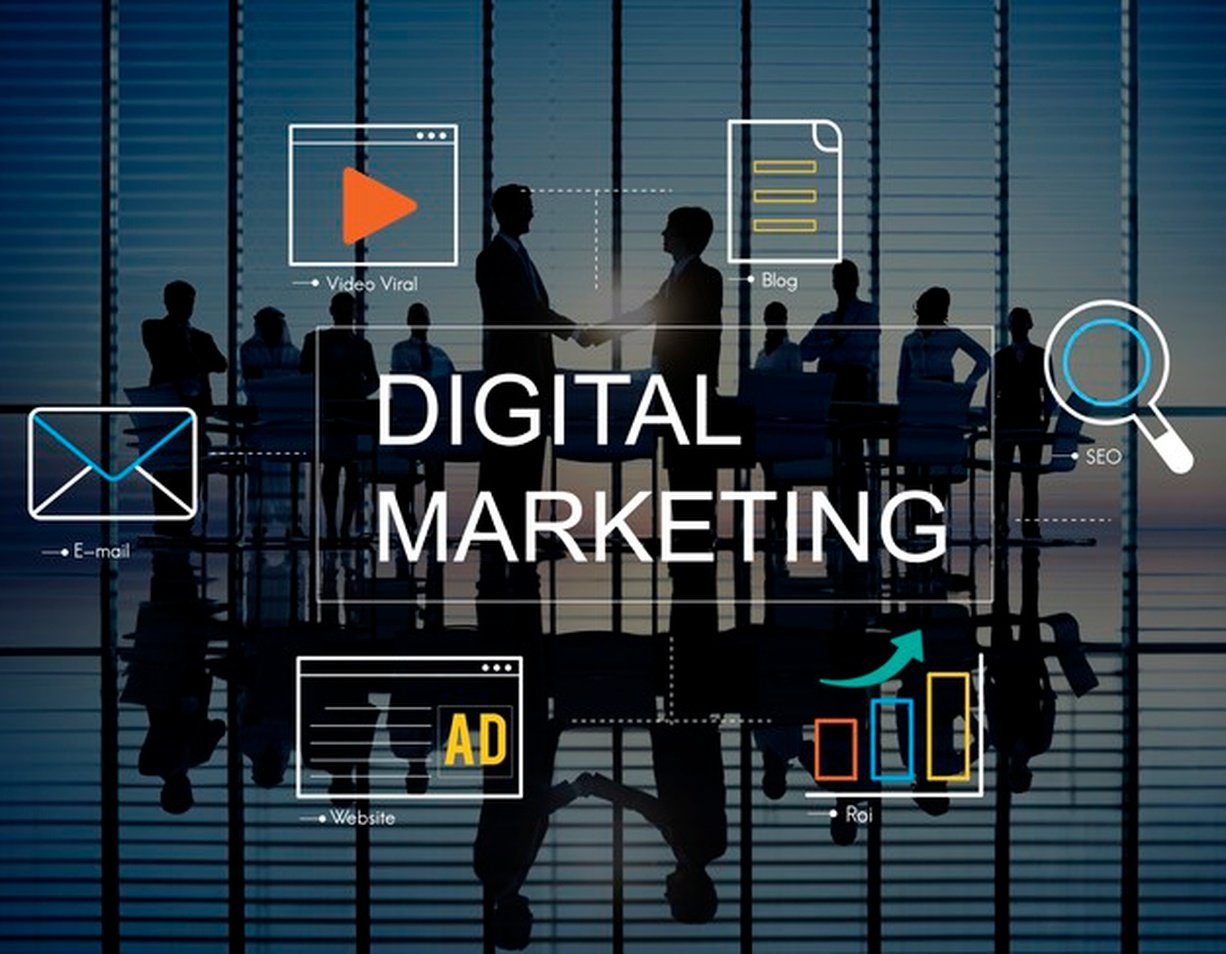Revolutionize Your Marketing Game with Digital Strategies: Get Ahead of the Curve and Stay on Top in 2023!

Marketing Game with Digital Strategies
Digital marketing has come a long way in recent years, revolutionizing the way businesses promote their products and services. With the rapid advancement of technology and the ever-evolving landscape of the online world, it’s crucial for businesses to stay ahead of the curve and utilize effective digital strategies to succeed in the competitive market. In this article, we will explore how businesses can revolutionize their marketing game with digital strategies, helping them stay on top of their game.
Understanding the Importance of Digital Strategies
In today’s digital age, businesses cannot afford to ignore the significance of digital strategies in their marketing efforts. Digital strategies encompass a wide range of tactics, including search engine optimization (SEO), content marketing, social media marketing, email marketing, pay-per-click (PPC) advertising, and more. These strategies are designed to target online audiences and drive engagement, website traffic, and ultimately, conversions. The digital landscape provides businesses with vast opportunities to reach their target audiences, expand their online presence, and outperform their competitors.
Unlocking the Power of SEO
One of the most essential digital strategies for businesses is search engine optimization (SEO). SEO involves optimizing a website’s content and structure to rank higher on search engine results pages (SERPs) organically. When done right, SEO can significantly increase a website’s visibility, credibility, and traffic, driving qualified leads and potential customers.
To optimize a website for search engines, businesses should focus on several key areas. First, conducting thorough keyword research to identify the keywords and phrases their target audience is searching for. These keywords should be incorporated strategically into the website’s content, title tags, meta descriptions, headers, and URLs. Second, creating high-quality, informative, and engaging content that resonates with the target audience and provides value. This can include blog posts, articles, videos, infographics, and more. Third, optimizing the website’s structure and navigation, ensuring it is user-friendly, mobile-responsive, and fast-loading. Lastly, building high-quality backlinks from reputable websites to boost the website’s authority and credibility in the eyes of search engines.
By implementing effective SEO strategies, businesses can enhance their online visibility, attract more organic traffic, and outrank their competitors, leading to increased brand exposure and potential conversions.
Crafting Compelling Content Marketing Strategies
Content marketing is another powerful digital strategy that can revolutionize a business’s marketing game. Content marketing involves creating and distributing valuable, relevant, and consistent content to attract and engage a target audience. Content can come in various formats, such as blog posts, articles, social media posts, videos, podcasts, and more.
When crafting content marketing strategies, businesses should start by identifying their target audience and understanding their needs, preferences, and pain points. This will help in creating content that resonates with the audience and provides value. The content should be well-researched, informative, and engaging, addressing the target audience’s concerns and offering solutions. It should also be optimized with relevant keywords to improve its search engine visibility and drive organic traffic.
In addition to creating compelling content, businesses should focus on distributing it effectively. This can involve sharing content on relevant social media platforms, guest posting on industry-related websites, leveraging email marketing campaigns, and more. Content distribution is crucial in expanding a business’s reach and driving more traffic to their website.
A well-executed content marketing strategy can establish a business as a thought leader in their industry, build trust with their audience, and drive brand loyalty, ultimately leading to increased conversions and revenue.
Leveraging the Power of Social Media Marketing
Social media marketing has emerged as a dominant force in the digital marketing landscape and has revolutionized the way businesses connect with their target audience. With billions of active users on various social media platforms, businesses can leverage the power of social media marketing to build brand awareness, engage with their audience, and drive conversions.
To effectively utilize social media marketing, businesses should start by identifying the platforms that are most relevant to their target audience. This can involve researching the demographics and interests of their audience and choosing the platforms where they are most active. Once the platforms are identified, businesses should create compelling and consistent social media profiles that reflect their brand identity and voice.
Content creation is key in social media marketing. Businesses should create engaging and shareable content that resonates with their audience. This can include a mix of promotional content, informative content, behind-the-scenes content, and user-generated content. The content should be visually appealing, concise, and aligned with the overall marketing goals and brand messaging.
In addition to content creation, businesses should actively engage with their audience on social media. This can involve responding to comments, messages, and mentions, initiating conversations, and encouraging user-generated content. Building a genuine and authentic relationship with the audience can foster loyalty and trust, leading to increased brand advocacy and customer loyalty.
Social media advertising is also a powerful tool in social media marketing. Platforms like Facebook, Instagram, Twitter, and LinkedIn offer robust advertising options that businesses can utilize to target their audience with precision. By creating targeted and compelling ad campaigns, businesses can increase their reach, drive traffic to their website, and generate leads or sales.
Unleashing the Potential of Email Marketing
Email marketing is a tried and tested digital strategy that can yield significant results for businesses. Despite the rise of social media and other digital channels, email marketing remains one of the most effective ways to communicate with a target audience and nurture leads.
To utilize email marketing effectively, businesses should focus on building a quality email list. This can involve creating opt-in forms on their website, offering valuable incentives to encourage sign-ups, and segmenting the list based on various criteria such as demographics, interests, and engagement levels. By segmenting the list, businesses can send targeted and personalized emails, resulting in higher open rates, click-through rates, and conversions.
The content of the emails should be valuable, relevant, and engaging. Businesses can send newsletters, product updates, promotions, and other types of content that align with their audience’s interests and needs. Personalization, such as using the recipient’s name and tailoring the content based on their preferences, can further enhance the effectiveness of email marketing.
Automation is another crucial aspect of email marketing. Businesses can set up automated email campaigns that are triggered by specific actions or events, such as welcome emails for new subscribers, abandoned cart emails, or re-engagement emails for inactive subscribers. Automation can save time and effort while ensuring that the right message reaches the right recipient at the right time.
Mastering the Art of Pay-Per-Click (PPC) Advertising

Pay-per-click (PPC) advertising is a digital strategy that allows businesses to place ads on search engine results pages (SERPs) and other online platforms, and only pay when users click on their ads. PPC advertising can provide instant visibility, drive targeted traffic to a website, and generate leads or sales.
To master PPC advertising, businesses should start by conducting thorough keyword research to identify the keywords and phrases that are most relevant to their business and have high search volume. These keywords should be strategically incorporated into their ad copy and landing pages to ensure relevance and quality score, which can impact the ad’s positioning and cost per click (CPC).
Effective ad copy is crucial in PPC advertising. Businesses should create compelling and relevant ad copy that entices users to click on their ads. The ad copy should highlight the unique selling proposition of the business, address the pain points of the audience, and include a clear call-to-action (CTA) to encourage clicks. A/B testing can be used to experiment with different ad copy variations and optimize for better performance.
In addition to ad copy, businesses should also optimize their landing pages to ensure a seamless user experience. Landing pages should be relevant to the ad copy and keywords, load quickly, and have clear and compelling content that aligns with the user’s search intent. A strong and persuasive CTA should be prominently displayed on the landing page to drive conversions.
PPC advertising platforms, such as Google Ads and Bing Ads, offer a wealth of targeting options that businesses can utilize to reach their desired audience. Businesses can target their ads based on demographics, interests, location, and even behavior, allowing for highly targeted campaigns. Continuous monitoring and optimization of the PPC campaigns can help to maximize the return on investment (ROI) and ensure that the budget is spent effectively.
Embracing the Power of Influencer Marketing
Influencer marketing is a digital strategy that involves collaborating with influencers, who are individuals with a large and engaged following on social media, to promote a business or its products/services. Influencer marketing can be a highly effective way to reach a wider audience and build brand credibility.
When implementing influencer marketing, businesses should first identify influencers who align with their brand values, target audience, and marketing goals. Researching the influencer’s content, engagement rates, and audience demographics can help businesses choose the right influencers for their campaigns. Building authentic relationships with influencers based on mutual respect and shared values can result in more genuine and effective promotions.
Collaborating with influencers can take various forms, such as sponsored posts, product reviews, testimonials, and giveaways. The content should be creative, engaging, and aligned with the influencer’s usual content style to ensure authenticity and resonate with their audience. Proper disclosure of sponsored content is essential to comply with legal guidelines and maintain transparency with the audience.
Measuring the success of influencer marketing campaigns can be challenging, but it is crucial to evaluate the effectiveness of the strategy. Metrics such as engagement rates, website traffic, conversions, and brand mentions can provide insights into the campaign’s performance. Businesses should continuously analyze the results and optimize their influencer marketing strategies accordingly.
Understanding the Importance of Local SEO
Local SEO is a digital strategy that focuses on optimizing a business’s online presence to appear in local search results. With the increasing use of mobile devices and the growing emphasis on localized searches, local SEO has become essential for businesses with a physical location or serving a specific local area.
To optimize for local SEO, businesses should start by creating and optimizing their Google My Business (GMB) listing. This involves providing accurate and up-to-date information, such as the business name, address, phone number, and website URL. Businesses should also choose the most relevant categories and upload high-quality images to showcase their products/services and location.
Consistency in NAP (Name, Address, Phone number) information across all online platforms, including the website, social media profiles, and local directories, is crucial for local SEO. Inaccurate or inconsistent information can confuse search engines and potential customers, resulting in lower search rankings and lost business opportunities.
Creating localized content is another important aspect of local SEO. Businesses can create location-specific landing pages, blog posts, and other content that is relevant to their target local audience. This can include information about local events, landmarks, customer testimonials, and promotions. Engaging with local communities through social media and online forums can also boost local SEO efforts.
Gathering positive reviews from satisfied customers is critical for local SEO. Reviews on platforms such as Google, Yelp, and Facebook can impact a business’s online reputation and influence search rankings.
The Future of Digital Marketing: AI and Automation
As digital marketing continues to evolve, the role of artificial intelligence (AI) and automation is becoming increasingly prominent. AI and automation technologies are transforming how businesses can optimize their digital strategies and stay ahead of the competition.
One of the key areas where AI and automation are making a significant impact is in data analysis and insights. AI-powered tools can analyze vast amounts of data and provide valuable insights into customer behavior, preferences, and trends. These insights can help businesses make data-driven decisions and tailor their marketing strategies accordingly, resulting in more targeted and effective campaigns.
Automation is also revolutionizing how businesses can manage their marketing campaigns. Automated tools can streamline repetitive tasks such as scheduling social media posts, sending personalized emails, and managing ad campaigns. This not only saves time but also allows businesses to scale their marketing efforts and deliver consistent messaging across multiple channels.
Personalization is another area where AI and automation are driving innovation in digital marketing. With AI-powered algorithms, businesses can analyze customer data and deliver personalized content and recommendations to individual users in real-time. This level of personalization can enhance the user experience, increase engagement, and ultimately drive conversions.
However, it’s important to note that while AI and automation can greatly enhance digital marketing strategies, human creativity and expertise still play a crucial role. Businesses need to strike a balance between automation and human touch to ensure that their marketing efforts are authentic, engaging, and resonate with their target audience.
Read More:5 Proven Digital Marketing Strategies to Boost Your Online Presence
Conclusion
In today’s digital landscape, implementing effective digital marketing strategies is essential for businesses to thrive and stay ahead of the curve. From optimizing websites for search engines to leveraging social media, content marketing, PPC advertising, influencer marketing, local SEO, and embracing the power of AI and automation, there are numerous strategies that businesses can utilize to revolutionize their marketing game.
By understanding the unique needs and preferences of their target audience, setting clear marketing goals, and continuously monitoring and optimizing their digital strategies, businesses can outperform their competitors, drive more traffic, generate leads, increase conversions, and ultimately achieve business success in the ever-evolving digital world.
So, whether you’re a small local business or a global corporation, it’s crucial to invest in digital marketing strategies that align with your business objectives, keep up with the latest industry trends, and adapt to the changing consumer behaviors. With the right digital strategies in place, you can get ahead of the curve, stay on top, and achieve long-term success in today’s competitive digital landscape.
Remember, digital marketing is not a one-size-fits-all approach, and it’s important to constantly evaluate and adapt your strategies to align with your specific business goals and target audience. With the right blend of creativity, strategy, and data-driven insights, you can revolutionize your marketing game and achieve exceptional results in the digital realm. So, get started today and take your digital marketing efforts to the next level!










